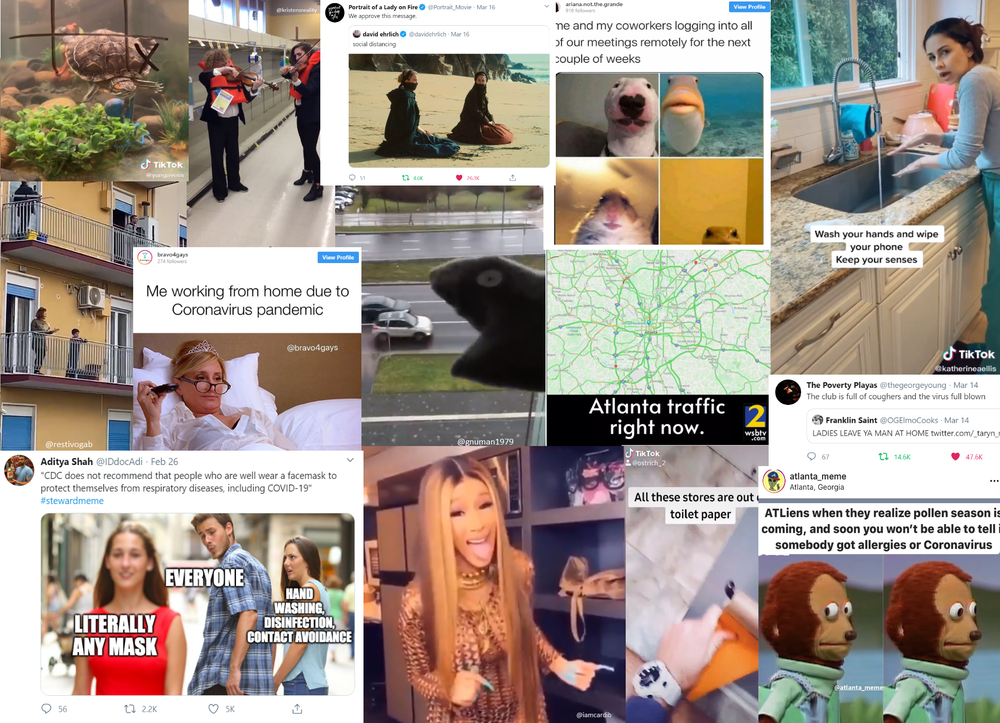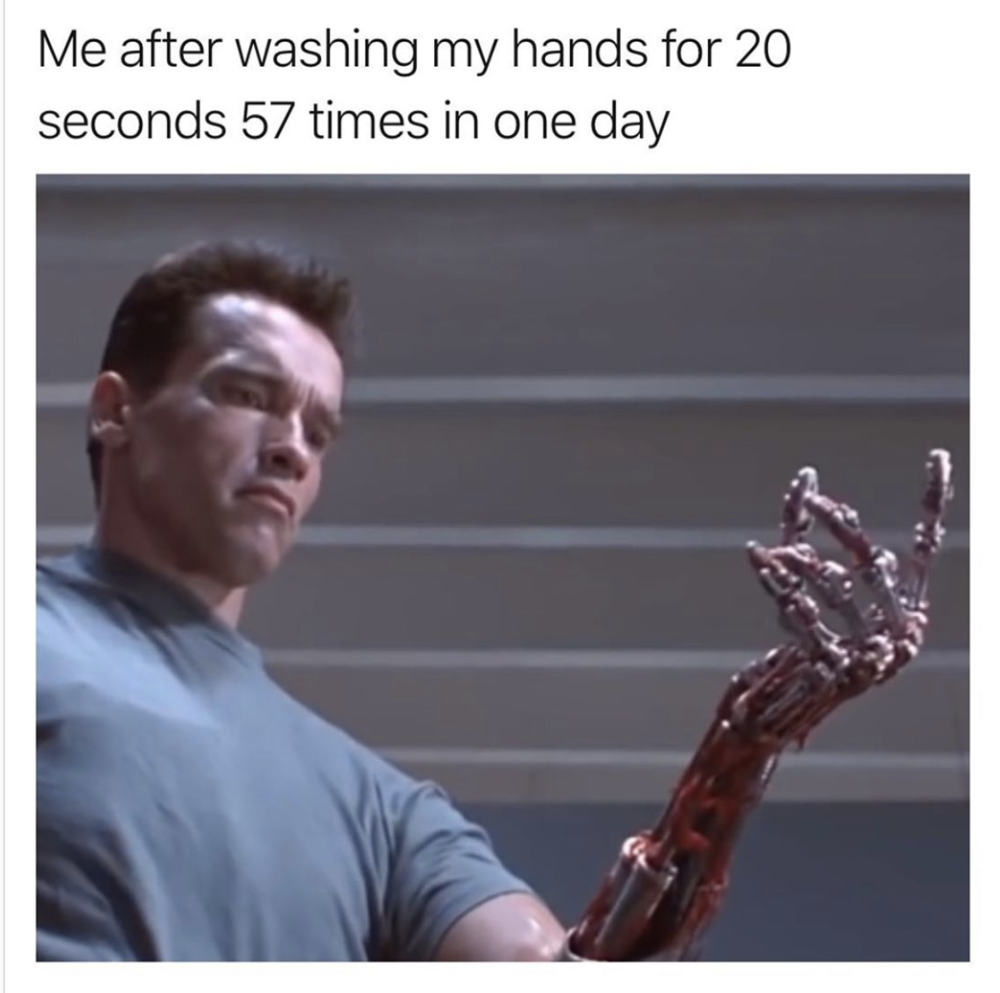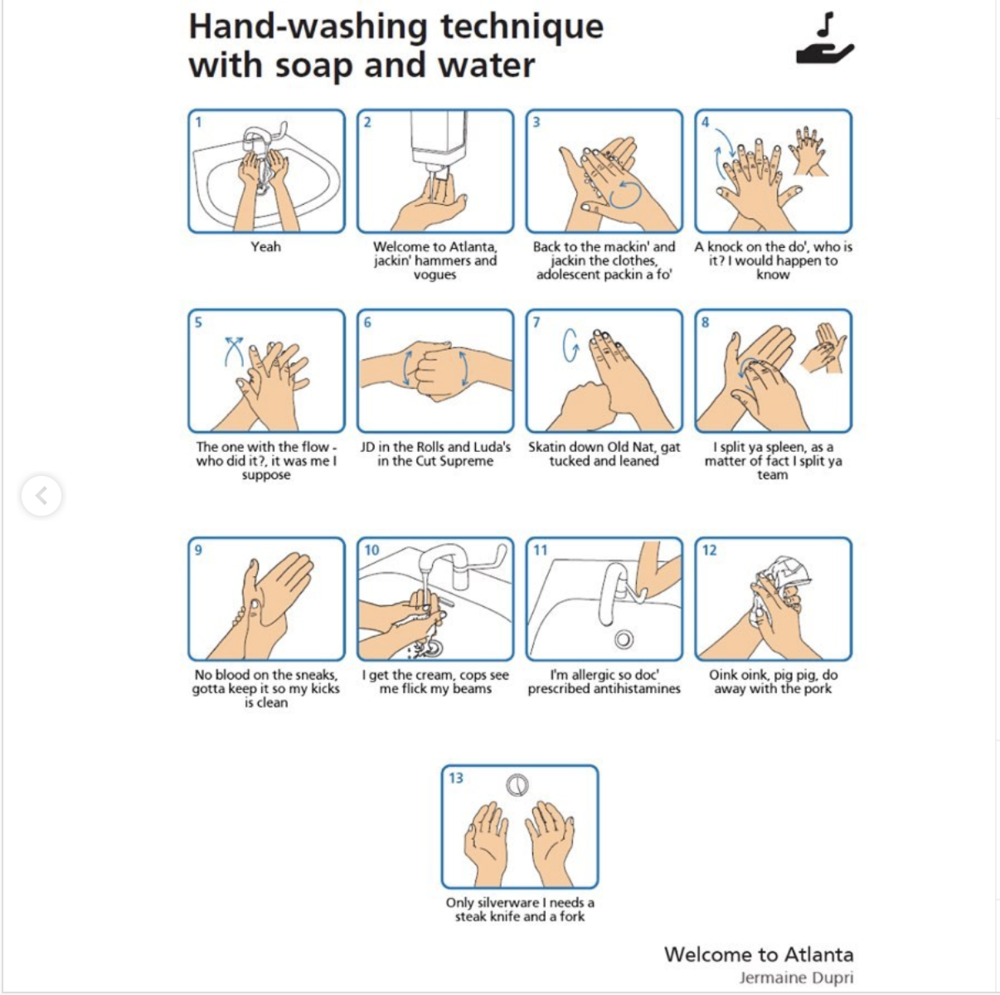Section Branding
Header Content
Coronavirus Goes Viral: How Online Meme Culture Reflects Our Shared Experience Of A Global Pandemic
Primary Content
Social distancing has become the new normal. With borders closing, shelter-in-place orders in California, lockdowns in Europe, and the Trump administration's guidelines to limit gatherings, millions of Americans are shuttering indoors — and spending a lot of time in front of a screen.
And the memes have flourished."On Second Thought" host Virginia Prescott speaks with Dr. Andre Brock and Emma Grey Ellis.
A number of videos went viral well before the United States was responding to the coronavirus pandemic with quarantines and lockdowns, including heartwarming videos of Italians singing together from their balconies, and a Vietnamese public service announcement that encouraged hand-washing and social distancing to prevent spread of the disease.
And since then, memes, tweets and TikToks have exploded. Much of the online response has focused on major themes of the current crisis, like the importance of cleaning and hygiene, the scarcity of hand sanitizer and toilet paper, what it's like working from home, and how boring quarantine can be.
So what does online meme culture reveal about how we're processing anxiety over this unprecedented pandemic in a digital world?
Emma Grey Ellis, staff writer at Wired specializing in internet culture and propaganda, joined On Second Thought to discuss how memes are able to connect people, spread information and relieve anxiety, even during a crisis like the coronavirus outbreak.
"I think that this sort of dark humor is kind of the last ditch effort of your brain to lift the mood a little bit," she explained. "It's completely fine to be joking about coronavirus. We need something to kind of bring us together and create a sense of community and levity."
Ellis' recent article for Wired, called "Is It OK to Make Coronavirus Memes and Jokes?," also touched on how, while online humor can serve as an outlet in difficult times, it can also propagate both misinformation and racism.
"Meme culture is often, you're just getting a snippet of time or an image or a phrase divorced of its context," she explained. "And the risk of that is that it can be misinterpreted."
Still, amid the coronavirus outbreak, there have been other benefits beyond online humor. A number of public and private institutions are providing free resources online to help people stay entertained and learn, even while physically isolated.
Dr. Andre Brock, associate professor at Georgia Tech who studies digital culture, also joined the conversation, noting that the internet has become a "communicative infrastructure" in society — and that this pandemic has magnified its role as a societal tool.
"I think that the internet has done something remarkable in this particular case where, people who have been asked to stay home in their far-flung suburbs, or in their urban locations, are now able to connect using resources, this particular resource, in ways they hadn't before," he said.
INTERVIEW HIGHLIGHTS
On how the virality of memes impacts the spread of information
Brock: Memes tend to draw upon shared cultural commonplaces. And for a large part of it, they draw on shared networks. So it's a group of people, your friends and your family, or usually a group of people who will understand where your humor is coming from. And in return, their friends and family will have maybe not the same understanding, but a similar one. Where memes become huge and become immensely taken up is when that initial content actually turns out to be relatable to many more people than their original user could have even imagined. While there are many deliberate memes, I find that many memes which were not as deliberate have somehow become also influential in helping people understand how to deal with this virus.
On how meme culture can propagate misinformation and racism
Ellis: Meme culture is often, you’re just getting a snippet of time or an image or a phrase divorced of its context. And the risk of that is that it can be misinterpreted. And so the internet's penchant for irony and satire has created some misinformation during this outbreak. One that comes to mind that was quite dangerous was someone joking about curing coronavirus by gargling with bleach, which you can imagine, if someone took it seriously, would be extremely harmful. The other negative outcome that we've seen is that a bunch of the memes have traded on ethnic humor and racial humor — which is offensive, obviously — but it can also lower people's inhibitions against committing acts of violence against the group that they're joking about. Which, considering that we're already seeing increased threats against Asian-Americans in particular, is something to take quite seriously.
On how meme culture makes correct information about the virus more interesting
Brock: I think Emma referred to it as people's dark humor and satire. And I think that's a really perfect understanding of how we respond to events that rupture our everyday existence. And so it can be understood as mocking if you are deliberately picking on the circumstance of somebody less fortunate than you with the intent of gaining power. But that's not these memes. These memes are making fun of situations [...] by trying to bring to light either absurd connections, such as the violinists playing in the aisle, [...] or less familiar things that have been brought up. So one of the things I've seen is the CDC page of illustrated instructions on how to wash your hands — and people are repurposing song lyrics to fit each panel. And so while that may be seen as disrespectful to the CDC’s attempt of passing on credible information, it's much more interesting to understand it, much more profitable to understand it. Twitter is particularly suited to this. I argue for Twitter as a space for catharsis. Right? And so meme culture on Twitter and other social media picks up on that rupture and finds that brief moment where it can make fun of something or make light of a situation that's really serious, in ways that people can relate to.
On how internet memes about coronavirus seem to have united people across language and culture like never before
Ellis: What's changed in the modern era is that we're able to share in each other's experiences a lot more easily, quickly and widely. And so it's a pretty striking event in that it’s affecting so many people around the world where, usually the Internet's focus is a bit more divided along, you know, language and national borders. But this is something that's sort of brought everyone together in a way that feels a bit unprecedented.
On how online interaction has become even more crucial in times of lockdown and quarantine
Ellis: I was speaking to a woman who specializes in conflict resolution yesterday and she compared posting on social media during this outbreak to a kind of sophisticated version of prisoners tapping back and forth on their jail cell walls to communicate with each other. I think that there is something super crucial about staying connected for any human, at any time. And now that we've become more isolated due to safety concerns, I think this is all the more important. And I think that we've seen that, right? There's an explosion of memes and contributions to internet culture — simply because people have more time, but also because it feels necessary.
On the impact of public and private institutions providing free resources during the coronavirus outbreak
Brock: I think [it] is building what I really would love to understand as a mutual aid society, where institutions, people and the government come together to provide comfort and aid and grace to people who are otherwise not able to do those type of distracting things for themselves on an everyday basis. So, in some ways, it's a really beautiful thing to see and I'm hoping it's something that we can retain in some reduced form after this, where we can continue to see institutions and the like make resources available to people who normally would not be able to take advantage of them.
Get in touch with us.
Twitter: @OSTTalk
Facebook: OnSecondThought
Email: OnSecondThought@gpb.org
Phone: 404-500-9457






